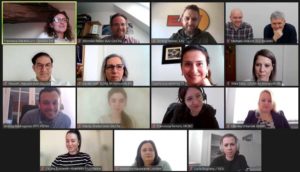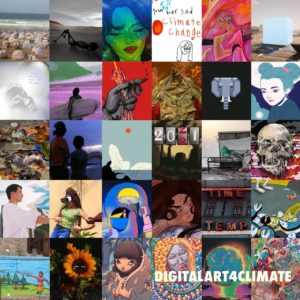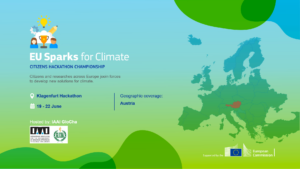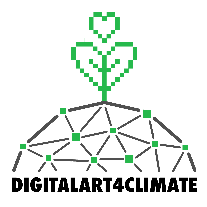Knowledge, Technology and Innovation for Climate Action Empowerment, UN STI Forum 2019 Side Event, 15 May 2019, UN HQ NY


UN STI Forum 2019 Side Event
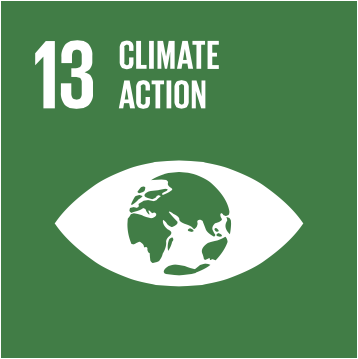
Diverse Approaches to Climate Action and Resilience:
Harnessing Knowledge and Technology to Empower Society
Date: Wednesday, 15th of May 2019, 6.30 – 8.00 PM
Venue: Conference Room 11, United Nations Headquarters, New York City

Main Organizers:
– International Association for the Advancement of Innovative Approaches to Global Challenges (IAAI) and
– Engineers Without Borders-California Polytechnic State University, San Luis Obispo Student Chapter
Co-organizing Partners:
- UN Major Group for Children and Youth
- YOUNGO: Youth Constituency to United Nations on Climate Change
- ECOS – Climate Action Education, Communication and Outreach Stakeholders Community
- Climate Chain Coalition CCC
- Fintech4Good
- Engineering for Change
- Mortenson Center for Global Engineering
- GloCha Global Challenges Foundation New York Inc.
I. Event Context and Event Intervention Logic
Effectively addressing the challenges brought about by climate change (= implementation of SDG13) will require effective mobilization of all stakeholders, especially young people, around the world.
This side event will present diverse approaches of engaging and equipping stakeholders to take action on climate change mitigating and adaptation through knowledge, technology and innovation.
Systematic solutions towards harnessing different sources of knowledge, technology and innovation will be explored through four thematic clusters. These include: (1) technology-facilitated mass mobilization for climate action (GloCha #ActionNow campaign); (2) sustainable energy entrepreneurship capacity building based on blockchain technology; (3) the critical role of local and indigenous knowledge, as well as nature-based solutions, in climate change observation, adaption, mitigation, and resilience; and (4) suggestions to the United Nations system to facilitate youth empowerment for climate action. I
II. Program outline
– Opening remarks, context setting / introduction
- Miroslav Polzer, IAAI GloCha
- Taylor Klein, UN MGCY & Engineers without Borders
- Saad Amer,YOUNGO
– Thematic Cluster 1: The Multistakeholder partnership GloCha and the role of knowledge, technology and innovation in youth empowerment for climate action
- Miroslav Polzer & Jerrica Rai Whitlock IAAI GloCha, (GloCha COP24 poster, #ActionNow campaign flyer)
- John Crowley, UNESCO Management of Social Transformations Programme (video message)
- Ed Erenberg, cheerity.com (cheerity capabilities for ActionNow)
- Andrew Macdonald, Friendship Ambassadors Foudation
- Laura Weiland, ECOS & Omega Ceter for Sustainable Living; (4 minutes each)
– Thematic Cluster 2: Blockchain technology and digital reporting as enabling technologies for climate action / climate entrepreneurship
- Xiaochen Zhang, Fintech4Good
- MartinWainstein, MIT Media Lab: Digital Currency Initiative – Open Solar https://dci.mit.edu/opensolar and ClimateBlockchain
- Tom McGrath, Vital CleanTech Ventures & Renewable Nations Institute (presentation)
- Eileen Doohan, GloCha Fdt NY & Vital CleanTech Ventures (presentation)
- representative of Climate Chain Coalition (video message) (4 minutes each)
– Thematic Cluster 3: Critical role of local and indigenous knowledge, as well as nature-based solutions, in climate change observation, adaption, and mitigation, as well as in building more resilient communities (16 minutes)
- David O’Connor, International Union for Conservation of Nature
- Silvia Ribeiro, ETC Group
– Thematic Cluster 4: Discussion with youth representatives, UN system representatives and Memebr states on how the global community can support youth empowerment for climate action through technology, knowledge and innovation (15 minutes)
Open question/answer discussion (10 minutes)
III Goals and Objectives
- Inform: participants about the multiple ways to engaging all stakeholders in the process of taking action on climate change with a broad and systemic perspective on different providers of relevant knowledge (including local and indigenous knowledge), formal and informal education, harnessing potentials of emerging technologies (like e.g. blockchain technology) and technology deployment ecosystems.
- Discuss: how different stakeholders, and especially youth, can be engaged in climate action.
- Document: relevant recommendations, specifically toward upcoming UN meetings as part of the TFM, UN SG Climate Summit preparations, UNFCCC COP25, 74th session of UN General Assembly
IV. Key topics and questions for discussioHow can the UN system better engage and empower non-state actors in climate action and resilience?
- How can the UN system better engage and empower non-state actors in climate action and resilience?
- What technological tools exist that can be used to empower (youth) climate action? How are they being implemented?
- What tools exist to leverage and integrate local and indigenous knowledge, nature-based solutions, and systems-approaches for climate action and resilience into policies?
- How can indigenous groups and local stakeholders be engaged in developing, implementing, and scaling solutions to climate change?
- How can local communities be engaged in providing data for critically assessing progress on SDG 13? What unique role does citizen science play in promoting this?
V. References
- Building the Intellectual Infrastructure for Global Climate Action, IAAI & ECOS Press Conference at COP24 UN Climate Change Conference in Katowice, 5th December 2019, https://unfccc-cop24.streamworld.de/webcast/building-the-intellectual-infrastructure-for-globa
- Youth Empowerment for Agenda 2030 Climate Action through Science, Technology and Innovation, STI Forum 2016 Side event, 7 June 2016, http://www.glocha.info/index.php/latest-news/289-stiforum2016ny
- Presentation of GloCha at the 2018 Annual Meeting of the Academic Council on the United Nations System, Rome, July 2018 https://youtu.be/AB7wjK3lO6Y
- Int. Conf “Sustainable Development, Innovation and Youth – Building the Knowledge Base and Information and Communication Technology Infrastructure for Youth Led Civic Engagement in Local and Global Sustainable Development Action, Klagenfurt, June 2014http://www.glocha.info/index.php/latest-news/270-glochaconf2014-2
